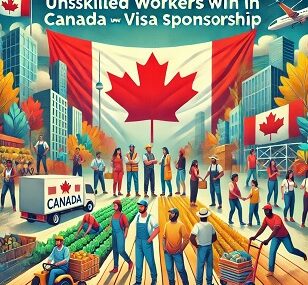Italy Immigration Requirements for Africans 2025
Introduction
Italy remains one of the most attractive destinations for African migrants and professionals in 2025. Whether you’re seeking work opportunities, higher education, family reunification, or permanent settlement, understanding Italy’s immigration requirements is crucial. This guide explains, in plain language, every step African citizens need to know to enter and live legally in Italy in 2025, based on current rules. It also includes practical tips, checklists, timelines, and testimonies from past applicants.
Why Italy Continues to Attract Africans
-
Vibrant economy and job opportunities in construction, hospitality, domestic care, agriculture, and emerging tech.
-
World-class universities offering English-taught programs.
-
Family and cultural ties due to historic migration links.
-
Pathway to EU residency — Italy is part of the Schengen area, giving access to other European countries once you’re legally resident.
Overview of Italy’s Immigration System
Italy regulates immigration for non-EU nationals, including Africans, through a mix of national laws and EU regulations. Key points:
-
Non-EU nationals generally need a visa to enter and a residence permit (Permesso di soggiorno) to stay beyond 90 days.
-
Quota system (Decreto Flussi): determines how many workers can be admitted each year by sector and country.
-
Special categories exist for highly skilled workers, seasonal workers, students, family reunification, and asylum seekers.
-
A 2024–2025 reform tightened family reunification requirements and improved worker protection.
Italy Immigration Requirements for Africans 2025
Main Visa and Permit Types for Africans
| Visa / Permit Type | Who It’s For | Key Features |
|---|---|---|
| Seasonal Work Visa | For agriculture, tourism/hospitality jobs up to 9 months. | Limited duration, tied to employer. |
| Non-Seasonal / Skilled Work Visa | For construction, industry, domestic care, health, tech, etc. | Quota-based; leads to longer stay permits. |
| EU Blue Card | Highly qualified professionals. | Higher salary thresholds; easier mobility in EU. |
| Family Reunification Visa | Spouses, minor children, dependent parents. | Requires sponsor with legal residence, adequate housing and income. |
| Study Visa | University or training in Italy. | Allows part-time work and possible post-study conversion. |
| Elective Residence Visa | Retirees or people with passive income. | Requires substantial funds and insurance. |
General Entry Requirements for Africans in 2025
1. Valid Passport: Must be valid for at least six months beyond planned stay.
2. Visa Approval Before Travel: Except in very limited cases, Africans must secure a visa at an Italian embassy or consulate before travelling.
3. Employer or Sponsor Support: For work visas, an Italian employer must obtain a work authorisation (nulla osta).
4. Proof of Accommodation: Lease agreement or employer-provided housing certificate meeting sanitary standards.
5. Adequate Financial Means: The sponsor or applicant must meet income thresholds set annually.
6. Health Insurance: Compulsory for long-stay visas until you’re enrolled in the Italian National Health Service.
7. Police Clearance: Certificate from home country to show no serious convictions.
8. Biometric Data: Fingerprints and photos taken at the visa centre and again when applying for residence permit.
9. Timely Residence Permit Application: Within 8 working days after arrival in Italy.
Special Requirements by Category
Work Visas under Decreto Flussi
-
Italy publishes annual quotas specifying the number of workers allowed from each country and sector.
-
Africans from countries with bilateral agreements (e.g., Nigeria, Senegal, Ghana, Egypt) have reserved slots.
-
Employer applies first for authorisation at the Single Immigration Desk. Once approved, the worker applies for visa at the Italian consulate.
Checklist for African Workers Applying for Italy 2025 Work Visa:
-
Job offer letter from Italian employer.
-
Employer’s nulla osta (work authorisation).
-
Valid passport and visa application form.
-
Police clearance and medical certificate.
-
Proof of accommodation (employer or self-arranged).
-
Travel insurance for initial stay.
Family Reunification
-
Sponsor must have been legally resident in Italy for at least two years (new rule from 2024).
-
Must show adequate housing (space, sanitary certificate) and minimum income.
-
Minor children are exempt from the two-year requirement.
Documents Needed:
-
Sponsor’s residence permit and passport.
-
Proof of relationship (marriage or birth certificate, translated and legalised).
-
Housing certificate from municipality.
-
Income proof (recent tax return or contract).
Study Visas
-
Admission letter from recognised Italian institution.
-
Proof of funds (at least €6,000–€8,000 per year).
-
Health insurance covering entire stay.
-
Accommodation arrangements.
-
Ability to cover return travel.
Expected Timelines
| Stage | Approximate Time |
|---|---|
| Employer applies for nulla osta | 1–3 months depending on quotas |
| Visa appointment & processing | 15–60 days depending on workload |
| Travel to Italy | After visa approval |
| Residence permit (Permesso di soggiorno) | Apply within 8 days; card issued within 2–6 months |
Italy Immigration Requirements for Africans 2025
Testimonies and Case Studies
Amina from Nigeria – Seasonal Work:
“I applied through my cousin’s employer in northern Italy under the agriculture quota. It took three months from job offer to visa. Housing was arranged by the farm, and after two seasons I was able to convert to a non-seasonal permit.”
Kwame from Ghana – Family Reunification:
“My wife had been working legally as a caregiver in Milan for three years. She had to prove income and a suitable apartment. Once approved, my children and I joined her with a family visa.”
These examples show that while documentation is strict, successful applications are possible with preparation.
Income and Housing Thresholds (Indicative)
The Ministry updates income requirements yearly. For 2025, typical figures are:
-
Single sponsor: at least €6,500–€8,500 per year (net) to bring one family member.
-
Additional family members: higher thresholds.
-
Housing: must meet minimum space per person and have sanitary certification from local ASL (health authority).
Path to Permanent Residence
-
After 5 years of continuous legal stay on eligible permits, Africans can apply for the EU long-term residence permit.
-
Must pass a basic Italian language test (A2 level).
-
Must show stable income and adequate housing.
-
Clean criminal record required.
Common Mistakes to Avoid
-
Waiting until quotas are exhausted before applying.
-
Submitting incomplete documents, especially translations/legalisation.
-
Not applying for residence permit within 8 days of arrival.
-
Using unlicensed agents; always verify information with consulates or official portals.
Step-by-Step Application Flow for an African Worker
-
Secure Job Offer in Italy.
-
Employer Applies for Nulla Osta (work authorisation).
-
Wait for Quota Availability and approval.
-
Apply for Visa at Consulate with all documents.
-
Travel to Italy once visa issued.
-
Apply for Residence Permit within 8 days.
-
Register with Local Authorities for integration courses if needed.
-
Renew Permit before it expires.
Italy Immigration Requirements for Africans 2025
Practical Tips for 2025 Applicants
-
Prepare Early: Get police clearance, passport renewal, translations months ahead.
-
Track Quota Announcements: The Italian government publishes them annually; apply quickly.
-
Language Preparation: Basic Italian helps with paperwork and integration.
-
Budget for Initial Months: Even with a job, you may need savings for the first 4–6 weeks.
-
Stay Informed: Laws can change; rely on official notices.
Living and Working in Italy as an African
-
Healthcare: Once registered with the National Health Service you’ll have access to public healthcare.
-
Education: Children of legal residents can attend public schools.
-
Employment Rights: Contracts must be written; you’re entitled to wages, rest, social security.
-
Anti-Exploitation Measures: New law increases penalties for employers exploiting migrants.
Timeline Example – From Nigeria to Italy as a Care Worker
-
January: Employer applies for nulla osta.
-
March: Authorisation granted; visa application lodged.
-
April: Visa issued.
-
May: Travel to Italy; apply for residence permit.
-
August: Permit card issued.
-
After 5 years: Eligible for EU long-term residence permit.
Conclusion
Italy’s immigration requirements for Africans in 2025 are stricter than before but also clearer and better organised. With the right documents, preparation, and understanding of quotas, Africans can successfully migrate for work, study, or family reasons. This guide has outlined every key requirement, from visas and permits to housing and income standards, plus real testimonies, timelines, and tips. By following these steps and starting early, African applicants can navigate the process smoothly and build a future in Italy.






